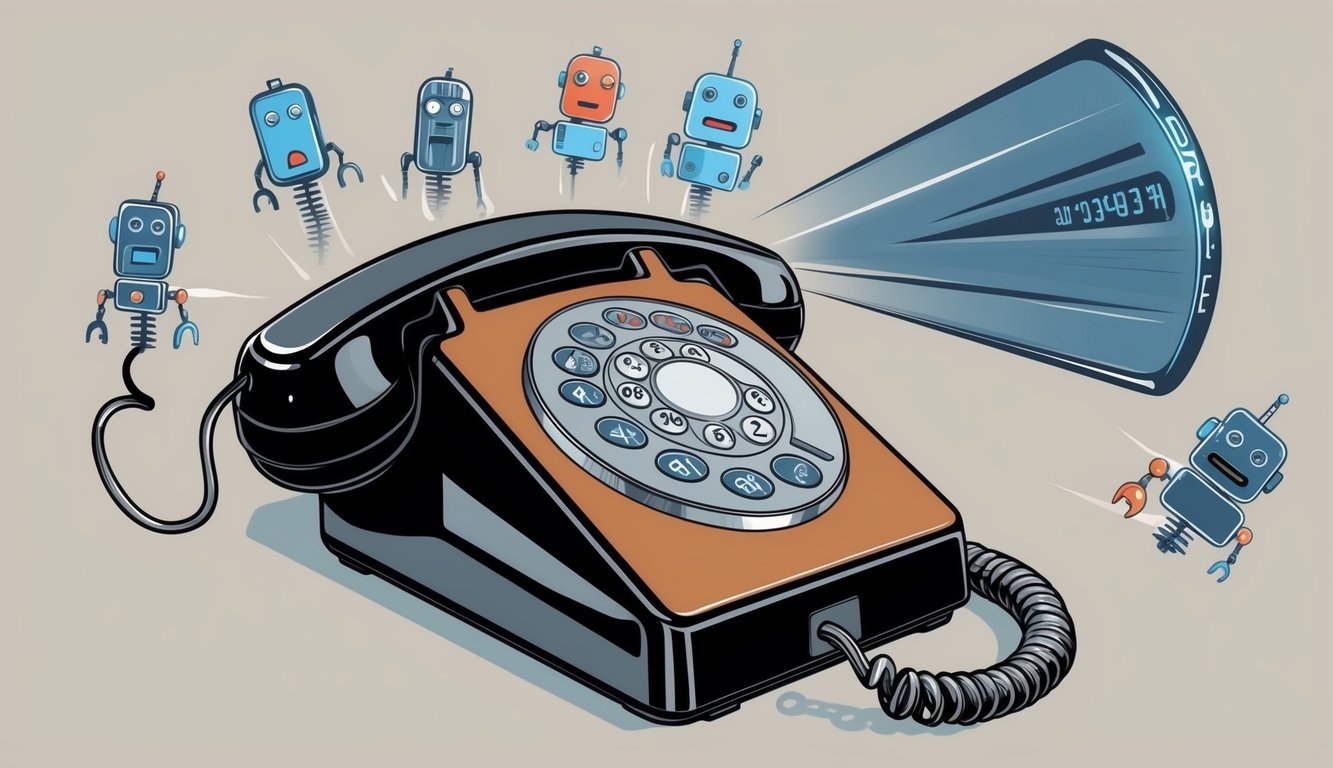“`xml
These days, robocalls seem to be a rite of passage, right? They interrupt our day with those relentless beeps and prerecorded messages.
But have you ever thought about flipping the script? Businesses and organizations are using automated calls to send messages to a bunch of people quickly and efficiently—what if you could join that party?
If you’re interested in jumping onto the robocall bandwagon, check out services like DialMyCalls.
They allow you to create and send automated voice messages to your contacts.
Pretty handy for reminders, alerts, or updates, don’t you think?
Now, before you get too excited, there’s a flip side.
If you’re not careful, you can end up with unwanted calls.
That’s where the National Do Not Call Registry comes into play—it’s a great way to cut down on those pesky telemarketing calls.
Signing up is straightforward and free, and once you’re on the list, most legitimate telemarketers are supposed to stop calling you.
Just keep in mind, those sneaky scammers might still find ways to reach you, so stay alert! Be cautious when sharing your number online; some sites might lure you into signing up for spam calls without you even knowing it.
Key Takeaways
- Robocall services can help businesses send automated messages to many contacts quickly.
- Using the National Do Not Call Registry can reduce unwanted telemarketing calls.
- Understanding robocall regulations helps keep a good balance between their advantages and respecting privacy.
Robocalls: Understanding Their Impact

Let’s face it—robocalls can be super annoying and, at times, downright creepy.
So, what exactly are robocalls and how do they affect our lives?
What Are Robocalls?
In simple terms, robocalls are calls where a computer dials a phone number and plays a recorded message.
You’ll often hear them in telemarketing, political campaigning, or even for important alerts from your favorite businesses.
Here are some of the common flavors of robocalls you might encounter:
- Sales pitches
- Political messages
- Appointment reminders
- Debt collection notices
Robocallers can crank out thousands of calls rapidly and at a minimal cost, which explains why you get bombarded.
Just to give you an idea, in January 2023, the U.S. saw a staggering 5.51 billion robocalls!
Ever notice how some of these calls look like they’re coming from a local number? That’s called “caller ID spoofing”—a sneaky tactic to trick you into picking up.
The Law Behind Robocalls and Telemarketing
Not all robocalls are bad—some actually follow the rules.
Legal robocalls can include:
- Political calls
- Charity requests
- Info-only calls (like school notifications)
- Calls from businesses you’ve dealt with
That said, many robocalls break the law.
If they’re sales calls using recorded messages, they typically require your consensual ‘okay’ to proceed.
Telemarketers have to stick to strict guidelines, like never calling before 8 AM or after 9 PM.
They’re also required to identify themselves and give you a good reason for calling.
Plus, if you ask them to stop, they have to respect that!
The FTC and FCC: Keeping Things in Check
The Federal Trade Commission (FTC) and the Federal Communications Commission (FCC) are on a mission to tackle illegal robocalls.
They craft the rules and take action against those who disregard them.
The FTC manages the National Do Not Call Registry, which is a free tool you can use to reduce telemarketing calls.
Signing up is a breeze!
On their end, the FCC has regulations that require phone companies to block obvious scam calls.
They’re also pushing for better caller ID technologies to expose those fakers.
If you find yourself on the receiving end of illegal robocalls, you can report them to the FTC.
Your complaints help them crack down on the bad actors.
And don’t forget, most smartphones come equipped with settings or apps that can block many robocalls.
Managing and Blocking Unwanted Calls
Let’s be honest—nobody likes dealing with unwanted calls.
Thankfully, you’ve got a bunch of strategies up your sleeve to fight back, from built-in phone tools to registries and reporting options.
It’s not a lost cause!
Call Blocking Tools and Resources
Most smartphones today have handy call blocking features.
If you’re an Android user, you’ll find the “Block Calls From Unidentified Callers” option in your settings. iPhone users can enable “Silence Unknown Callers” to send those mysterious numbers straight to your voicemail.
Many phone carriers also provide their own blocking services.
AT&T has Call Protect, Verizon offers Call Filter, and T-Mobile users can benefit from ScamShield.
These tools can mark suspicious numbers and even block some calls before they reach you.
Plus, there are great third-party apps like Nomorobo and RoboKiller that rely on extensive databases of known spam numbers to help keep your phone quiet.
A small fee might be involved, but for many, the peace of mind is totally worth it!
Using Do Not Call Registries
The National Do Not Call Registry can seriously help cut down on telemarketing calls.
Signing up is no hassle, whether you do it online or via phone.
Once you add your number, most legit companies should stop calling you.
But remember, it’s not foolproof.
You’ll still receive calls from scammers and certain organizations like political campaigns and charities.
Some states even have their own do-not-call lists, so check with your local consumer protection office to see if you can beef up your defenses!
Reporting Unwanted Calls
When the annoying calls slip through the cracks, reporting them can make a real difference.
The Federal Trade Commission (FTC) accepts complaints about these calls.
Just file a report on their website or give them a call.
Keep a record of those pesky numbers.
Jot down the date, time, and any details you can recall about the caller.
This info can help when you make your report.
If you receive scam calls or threats, don’t hesitate to reach out to your local police.
They may not be able to stop every call, but they can keep an eye on patterns and alert others in your neighborhood.
Advanced Solutions and Mobile Security
If you’re tech-savvy, you might be interested in some high-tech options.
Certain phones can screen calls, requesting callers to state their purpose before you pick up—consider it like having a digital assistant!
Mobile security apps often bundle call protection features.
They can flag known scam numbers while providing warnings about suspicious calling behavior.
Some even utilize AI to spot emerging scams!
If you have a home phone, especially with VoIP, ask your provider about call labeling.
This feature marks calls that are likely spam, so you can make the best decision on whether to answer.
Keep in mind that no solution is perfect.
Stay alert and trust your instincts.
If a call feels off, it probably is—just hang up and report it!
Frequently Asked Questions

Got questions about robocalls and how to receive them? You’re definitely not alone! Here are some of the most common inquiries:
How Can I Start Receiving Robocalls on My Phone?
Well, here’s the thing: robocalls have a bit of a bad rap.
But if you’re looking to receive them, it usually involves signing up for services that use automated calling to get messages out efficiently to a large number of people.
What Are Robocalls?
Robocalls are phone calls that employ a computer to dial numbers and play back a recorded message.
While telemarketing is often the name of the game, they can also include political pitches or vital alerts.
Common types of robocalls you might encounter include:
- Sales pitches
- Political messages
- Appointment reminders
- Debt collection notices
Due to their rapid and cheap calling capabilities, robocallers can inundate the phone lines.
Just to give you an idea, in January 2023, there were around 5.51 billion robocalls in the U.S.!
But beware of “caller ID spoofing.” This crafty trick makes it look like a call is coming from your local area code to entice you to answer.
The Legality of Robocalls and Telemarketing
Not all robocalls are illegal.
Some can be perfectly fine if they adhere to regulations.
Legal robocalls include:
- Political calls
- Charity requests
- Information-only calls (like school closures)
- Calls from companies you have a relationship with
However, a lot of robocalls are against the law.
Sales calls using recorded messages typically require your explicit permission.
Telemarketers also have several rules to follow.
For instance, they can’t call before 8 AM or after 9 PM, must identify who they are, and can’t keep calling if you ask them to add you to their “do not call” list.
The Role of the FTC and FCC
The Federal Trade Commission (FTC) and Federal Communications Commission (FCC) are hard at work to combat illegal robocalls.
They create the regulations and pursue companies that flout them.
The FTC operates the National Do Not Call Registry.
You can add your number here to minimize telemarketing calls—remind me, that’s a pretty sweet deal!
The FCC has its regulations as well, requiring phone carriers to block obvious scam calls and calling for improved caller ID technology to catch deceptive numbers.
If you receive illegal robocalls, don’t hesitate to report them to the FTC.
Your input is valuable in helping them take down offenders.
You can also use your device’s settings or additional apps to block many robocalls automatically.
Are There Any Legal Restrictions on Sending Mass Spam Calls or Texts?
You bet! There are strict guidelines regarding robocalls and text messages.
The FTC prohibits many types of automated calls that lack prior consent, and fines for violations can be hefty.
There are some exceptions for political and charity calls—but for the most part, commercial robocalls aren’t played by the rules.
“`

